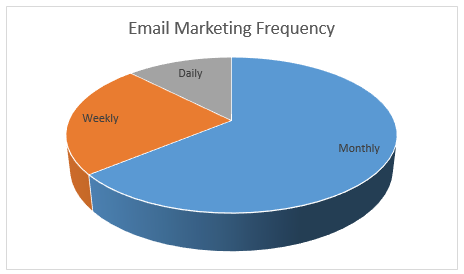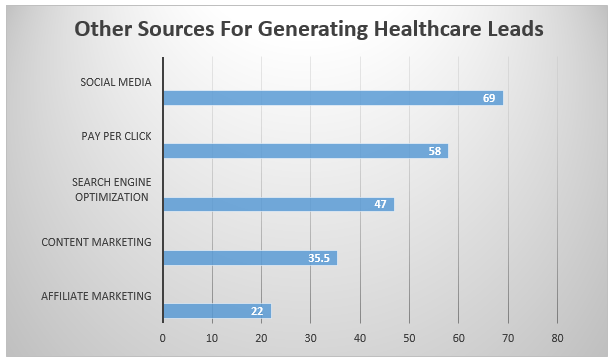
- Date: Jan 06, 2020
- Category:
In today’s digital age, email marketing is a must inclusion in every healthcare marketing plan. The high rate of return, low cost, quality leads, and wider market reach are some of the many reasons why email marketing has always been every marketers’ favorite tool. From patient engagement to building relationships and spreading the brand message, emails can fit into any strategic model of businesses with different targets and objectives. Hence, it is imperative to use email marketing to grow your healthcare business or practice.
However, many healthcare marketers still hesitate to implement email as part of their marketing strategy. As a result, they lose out on immense market opportunities and fail to connect with the right audience within their marketing budget. It is a lack of real-time insights that marketers are not sure about whether they should invest in email campaigns or not. To clear things out, recently, we conducted a survey among healthcare marketers and sales executives from the B2B space to know their opinion about email marketing and its effectiveness.
For instance, 10 out of 15 surveyed revealed to have been extensively using email marketing for the last few years, three of them were ready with email strategy for 2020. Here arises the question, then what are the rest two doing?
Have a look at our survey findings to understand the scenario better.
Email Marketing Plans
Our survey began with a straightforward question that talked about relevance and possibilities. As the survey was all about email marketing insights, so we wanted to come to the main point at first. It was necessary to know that whether the marketers taking up the survey can relate to it and answer genuine stuff. We asked some healthcare marketers if they are currently using email marketing or have plans to leverage the tactic for their healthcare business. And their answer was not at all surprising.
More than 55% of marketers agreed to have been successfully leveraging email campaigns for their healthcare promotions for quite a long time. Whereas nearly 45% expressed interest in including emails into their healthcare marketing strategy in the days to come.
What caught our attention is the positive response from marketers who willingly took part in the survey to share their email marketing success experience. Those who are planning to run email campaigns are the ones influenced by industry trends and have seen fellow business rivals gain huge success with responsive and lead generating email marketing campaigns.
More Marketers Started Using Purchased Lists
Earlier, most of the business refrained from purchasing an email list. They considered that purchased lists are inaccurate and not trustworthy. Instead, they should build the list themselves as it will more reliable and cost-effective. But with this survey, we got to know a different perspective.
About 35% of marketers revealed that they purchase email lists from database providers as they found their data reliable and efficient in helping them reach the right potential customers and achieve higher lead counts. Marketers hesitated to buy data thinking that it will land their messages into the customer’s spam folder. But with an increasing number of accurate and reliable data provide throughout the healthcare industry, their perception changed, and they are saving time with purchased healthcare email lists and focusing more on strategies.
Whereas, only 25% rely on building their own email list, and this stat includes those marketers who are still stuck with the traditional marketing approach and are reluctant to embrace any technological and digital advancements.
Email Automation Tools and software
Email automation is slowly gaining popularity across industries. Even in the healthcare field, marketers have started to rely on automation tools and software like GetResponse, MailChimp, Constant Contact, and more that offer easy-to-use and multiple features for seamlessly scheduling automated emails and trying our new email template designs.
When asked marketers about their response to email automation and the software they use to run campaigns, many responded positively. The trend is changing, and more and more healthcare marketers found setting up automated email newsletters to ensure communication with the audience as per the schedule. Out of all the options we provided, more than 45% accepted they use MailChimp. Whereas 31% use GetResponse, 25% Constant Connect, 15% SendinBlue and others 9%.
Brands Send Email Monthly? Weekly? Daily?
Our recent survey conducted to understand the email marketing habits of B2B healthcare marketers better revealed interesting facts. While 57% said that they send monthly emails, 21% and 11% send weekly and daily emails, respectively.
Often, marketers get confused, deciding over what should be the frequency of their email campaigns. Most of the experts say that sending too many emails quite often may annoy customers. Moreover, the more frequently you send emails, the lesser valuable it becomes. While on the opposite side, there are marketers who continue to bombard customer inbox with too frequent emails. Based on our survey experience and market analysis, what we conclude is that it is not wise to send emails every day. However, sending emails 4 to 5 times in a month is of an acceptable range.
Email Performance Metrics
B2B healthcare marketers who took up our survey expressed immense satisfaction in terms of the performance of their email campaigns. Around 56% of them agreed that email campaigns helped them achieve above 35% of click-through (CTR) and the open rate, which they were missing earlier. Their marketing efforts showed immense growth and success ratio.
Earlier, most of the survey undertakers had slow and inconsistent business growth. But from the time they started relying on email marketing practices, their revenue generation increased by 90%, and the graph is on the rise for long. There has been a positive improvement only.
Other Sources for Generating Healthcare Leads
Apart from email marketing, through our survey, we also wanted to understand if not emails, then what other channels marketers in the healthcare industry are using to reach prospects, spread brand awareness, and generate more leads and drive high ROI.
Undoubtedly, email is the undisputed channel that most of the marketers rely on. Although not equivalent, social media is the next channel in demand that many B2B companies in the medical sector invest in to grow their business. Nearly 69% of marketers stated they use social media, whereas pay-per-click (58%), search engine optimization (47%), content marketing, (35.5%), and affiliate marketing (22%).
Email Marketing Goals for 2020
As the number of email users is likely to reach 246 billion, marketers across industries are eager to take advantage of this increasing email user base. Especially considering the findings of our survey, one thing is very clear that B2B healthcare marketers are keen to embrace email as their effective channel for customer engagement, communication and brand promotions, and product marketing.
According to our recent survey report, more than 65% are already having an email strategy while the rest 35% of brands have email marketing included in their 2020 marketing plan. As we move towards a New Year, these stats are likely to change for the better, indicating increased adoption of email marketing for healthcare promotions.
Get Started with Your Email Strategy!
Overall, through this survey, not only we got a better market perspective, but also even our healthcare clients gained huge insights about the approach and email marketing behavior and patterns of their fellow marketers. With the real-time survey data shared here, we hope to prepare you for the coming year and help you make informed marketing decisions for your healthcare business.









